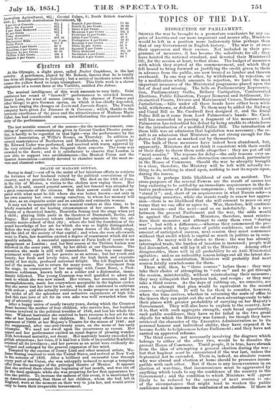DEATH OF MADAME SONTAG.
Sontag is dead !—cut off in the midst of her laborious efforts to retrieve the fortunes of her husband ruined by the political convulsions of his country, and to provide for her children. She died on the 18th of June, in the city of Mexico, a victim to the cholera now raging there. Her death, it is said, caused general sorrow, and her funeral was attended by a great concourse of the citizens. But their sorrow could not be com- pared with what must be felt where she was better known—not only in her own country but even among ourselves, to whom her memory will be dear, as an exquisite artist and an amiable and estimable woman.
It may not be unacceptable to our musical readers at this time, to be briefly reminded of the leading circumstances of her career. Born in Prussia of a theatrical family, Henrietta Sontag trod the stage when yet a child ; playing little parts in the theatres of Darmstadt, Berlin, and Prague. Her precocious talents obtained her admission into the ad- mirable music-school of that city ; where she laid the foundation of the sound knowledge of her art for which she was so highly distinguished. Before she was eighteen she was the prima donna of the Berlin stage, and the idol of the society of that capital ; and when she soon afterwards went to Paris, her desertion excited a degree of resentment which did not speedily subside. A successful appearance at Paris leads of course to an engagement at London ; and her first season at the Theatre Italien was followed in the same year, 1828 by her debt at our Operahouse. The sensation she made is still well remembered. There was some disap- pointment with regard to her powers as an actress; but her youth and beauty, her fresh and lovely voice, and the high finish and exquisite purity of her style, produced universal delight. She left England at the end of the season, not to return for many years. Her retirement from the stage, in consequence of her marriage with Count Rossi, a Pied- montese nobleman, known both as a soldier and a diplomatist, imme- diately followed. The young Countess was well qualified to adorn the rank to which she was now raised. Her virtues, her manners, and her accomplishments, made her everywhere acceptable in the highest circles. But she never lost her love for her art, which she continued to cultivate With ardour ; and she actually continued to make progress as an artist in the midst of all the splendour and seductive enjoyments of high life. And this rare love of art for its own sake was well rewarded when the day of adversity came.
After a happy union of nearly twenty years, during which the Countess Rossi became the mother of four children, who survive her, her husband
became involved in the political troubles of 1848, and lost whole for- tune. Withoutlesitation she resolved to have recourse to her art for the sake of her husband and her children. Mr. Lumley offered her an en- gagement of 70001. at her Majesty's Theatre for the season of 1849; and she reappeared, after one-and-twenty years, on the scene of her early triumphs. We need not dwell upon the occurrences so recent. Her aspect and her performance excited an equal degree of pleasing wonder. Both betokened maturity, not decay. Her matronly beauty exceeded her girlish attractions; her voice,if it had lost a little of its youthful flexibility, retained all its loveliness ; and her powers as an artist were evidently de- veloped and enlarged by the general expansion of her mind. Tempted by the success of Jenny Lind and other musical artists, Ma- dame Sontag resolved to visit the "United States, and arrived at New York in the autumn of 1852. After a brilliant and suceessful tour through every part of the Union, she was unhappily induced to accept a tempting offer from the manager of the principal theatre of Mexico. It appears that she arrived there about the beginning of last month, and was cut off by the fatal epidemic while she was preparing for her first appearance be- fore the public. To increase the sadness of this event, it is mentioned by an American journal, that three of her children, whom she had left in England, were at the moment on their way to join her, and would arrive only to learn their irreparable bereavement.


























 Previous page
Previous page